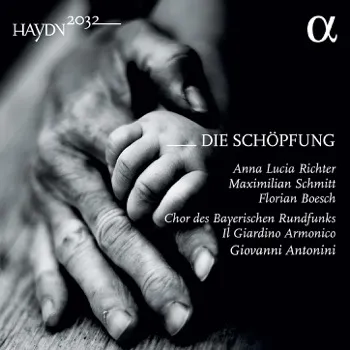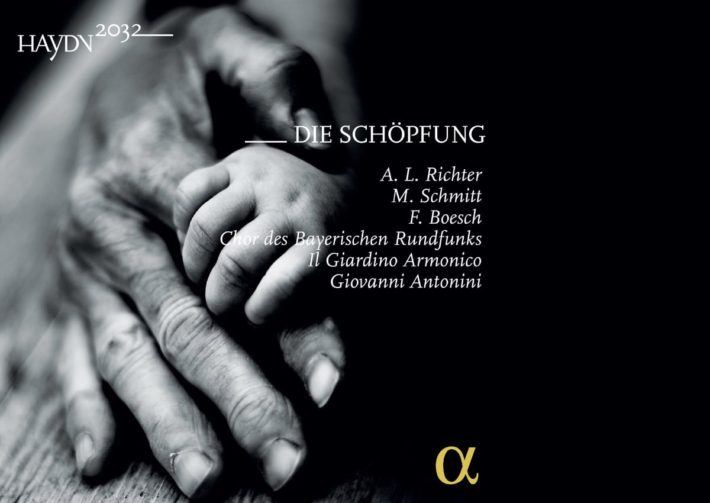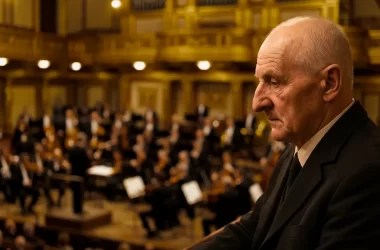The Haydn 2032 project from Giovanni Antonini and Il Giardino Armonico take a break from their ongoing symphony cycle (shared with the Kammerorchester Basel) into a slightly different territory, with a recording of “Die Schöpfung” (“The Creation”). This popular and approachable work has incarnations in both German and English, having been published in 1800 in both languages. Here Antonini chooses the original version in German.

There are both Handelian and Mozartian qualities to the work, combining the baroque-molded recitatives and choruses with classically styled operatic-inspired arias. Setting the tone for the entire performance, the introduction with its depiction of chaos is slightly reserved, reticent and polite. Antonini’s tempi are cautiously safe, and there is little risk taking or spontaneity, maybe unexpected when coming from these forces’ energetic Symphonies performances.
The three solo voices, Anna Lucia Richter, Maximilian Schmitt and Florian Boesch, are equally matched and balanced. Richter performs the recitatives well, yet in the aria “Auf starkem Fittiche schwinget sich der Adler stolz” (track 15), though diligently executed, the reserved pacing doesn’t allow for her coloratura to truly shine. In “Mit Staunen sieht das Wunderwerk” (track 5), there are subtle contrasts between the phrases, but both Richter and Antonini don’t make as much of them as they could. Suffering the same fate, “Die Himmel erzählen die Ehre Gottes” (track 14), whilst pleasant, lacks clarity and definition of the solo voices.
The moments the soloists, choir and orchestra come together, as in tracks 19 and 26, provide the strongest moments of the performance. Boesch and Richter portray Adam and Eve with a gentle naivety and comedy, which gently entertains the audience (sample track 3, CD 2). Schmitt is strong throughout and slightly more resonant than his previous recording of the work with Réne Jacobs.
My small reservations from the arias do not diminish the forces’ unity, which brings a level of conviction to Antonini’s vision. The orchestral playing is superb; The woodwind parts throughout rise and fall from the texture. Recitatives incorporate stylishly executed flourishes, and the balance with the cello is excellent, preventing the harpsichord from sounding dry.
The intonation from the period strings is strong, their precision and unity in “Und Gott sprach: Es sammle sich das Wasser” (track 6), is one of the many orchestral highlights. The 45-member Chor des Bayerischen Rundfunks is nicely balanced throughout and makes a commendable sound. Their tone is rich and full, and they are appropriately sized for the small orchestral forces employed. Occasionally, the inner lines shine through as in track 14, highlighting the color and strength of the altos and tenors. This is not as frequent as it could be, which at times is an opportunity lost.
The choir is far from being slim, but Haydn conceived this with a substantial choir and orchestra, the scale being huge for the time. I sometimes missed the clear diction and polish one hears from English-sang versions like Paul McCreesh and Harry Christophers, which employs bigger forces, depicting the work on a larger canvas of sound. Antonini’s soloists and choir are good, but lack the same polished annunciation.
The booklet is nicely presented, credits all the musicians and contains a full translation. Recorded in Herkulessaal, Munich, the engineering is strong, but does allow for occasional audience intrusion. Overall, a modest and rather tender performance of “Die Schöpfung”, complementing Antonini’s ongoing Haydn journey.
Recommended Comparisons
Christie | Karajan | Gardiner | McCreesh
Haydn – Die Schöpfung (The Creation)
Anna Lucia Richter – Soprano
Maximilian Schmitt – Tenor
Florian Boesch – Baritone
Chor des Bayerischen Rundfunks
Il Giardino Armonico
Giovanni Antonini – Conductor




















